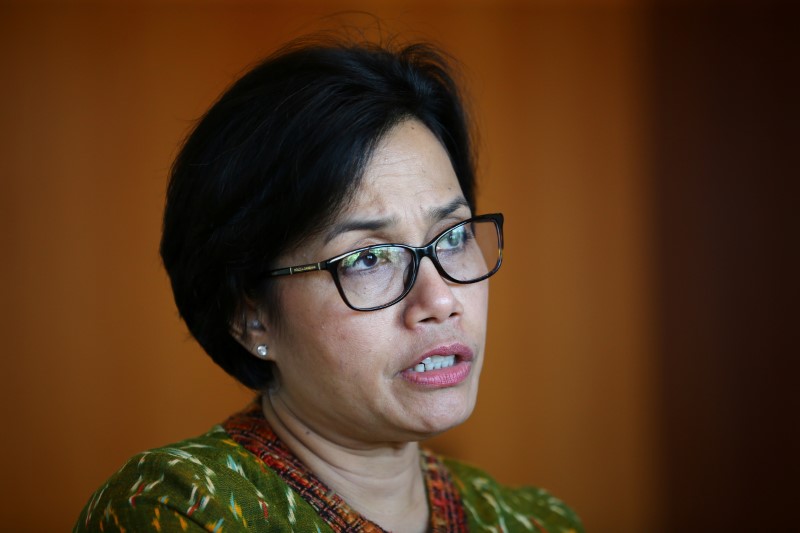
FILE PHOTO: Indonesian Finance Minister Sri Mulyani Indrawati during an interview with Reuters ahead of the G20 summit in Hamburg, Germany, July 6, 2017. REUTERS/Wolfgang Rattay
May 28, 2018
By Maikel Jefriando and Tabita Diela
JAKARTA (Reuters) – An out-of-schedule Indonesian central bank policy meeting on Wednesday will allow a quick response to market movements, Bank Indonesia’s new governor said on Monday, as a growing number of economists bet on an interest rate hike at the session.
Perry Warjiyo, sworn in as governor last week, said it was not an “emergency meeting”, but the rupiah <IDR=> jumped to a two-week high on hopes central bank actions would relieve persistent pressure on the country’s financial markets.
Bank Indonesia on May 17 raised its benchmark interest rate <IDCBRR=ECI> for the first time since November 2014 in a bid to bolster the fragile rupiah and stem an outflow of capital. On Friday, it said it will hold an additional meeting on May 30 to discuss economic and monetary conditions.
“The dynamics offshore happen so quickly and market perceptions are formed quickly that there is a tendency that some became irrational. These dynamics need to be responded to immediately to stabilize things,” Warjiyo said, adding that Wednesday’s meeting will look ahead to the Federal Reserve’s policy review in June.
At Monday’s joint news conference of policymakers, Darmin Nasution, the coordinating minister of economics, said economic regulators will prioritize stability in the short-term and economic growth in the medium-term.
“We are not in a crisis. These are to strengthen things, to respond to dynamics,” said Nasution.
Last week, Warjiyo promised to use interest rate policy to stabilize the rupiah in the near term and to be “more pre-emptive” and ahead of the curve on monetary settings.
The rupiah has been among the worst performers among Asian currencies this year, losing about 3 percent of its value, as investors slash their holdings in emerging markets in response to rising U.S. Treasury yields.
DBS said in a note that weaker sentiment on emerging market debt had pushed several central banks including Argentina and Turkey to take on a more hawkish stance to control capital outflow risks and maintain financial markets stability.
“Against this backdrop, further BI rate hikes may be needed, with the next one possibly as early as this week,” it said.
THE 2013 VOLATILITY
Economists at Citi and Morgan Stanley also predicted a rate rise, while Natixis said it expected the central bank to be guided by a 2013 precedent and to take decisive moves.
When Indonesia last faced such market volatility in 2013, during the so-called “taper tantrum”, Indonesian policymakers took a series of measures to restore calm.
These included BI raising rates by 175 basis points, allowing the exchange rate to depreciate and preparing bilateral swap agreements.
At Monday’s meeting, Finance Minister Sri Mulyani Indrawati said the government planned to improve debt management and governance of its state-owned enterprises (SOEs) as part of measures to maintain economic stability,
“SOEs will optimize equity financing while maintaining leverage levels under a safe threshold so that they do not create a negative perception towards SOEs as well as the national economy,” Indrawati.
Officials also list a number of measures they have taken to mitigate risks to the economy, including bigger food imports to keep prices low and more tax incentives to attract foreign direct investment.
(Reporting by Maikel Jefriando and Tabita Diela; Writing by Gayatri Suroyo and Fransiska Nangoy; Editing by Richard Borsuk)

